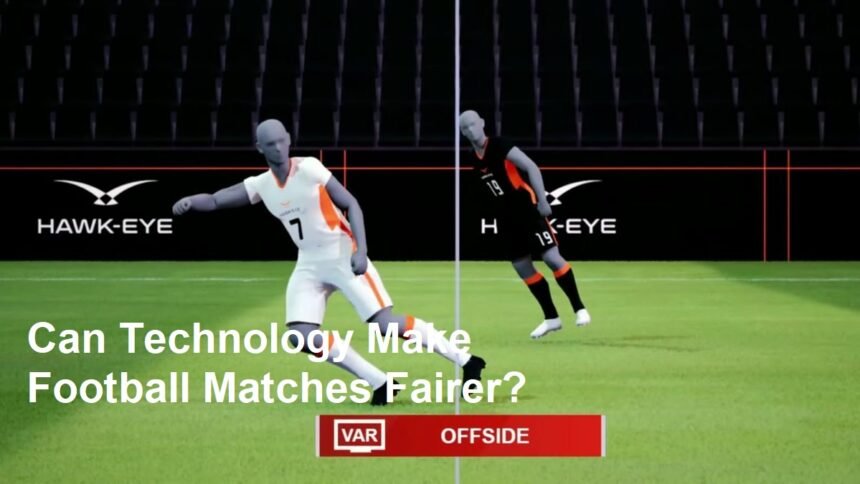Introduction: Football’s Eternal Debate
Football is known as “the beautiful game,” but it’s also one of the most debated when it comes to refereeing decisions. From controversial red cards to last-minute offside calls, a single decision can flip the outcome of an entire season.
Enter AI referees in football. With the rise of VAR technology and automated officiating systems, football authorities are asking: Can technology make football matches truly fairer?
For fans, this question is not just about accuracy—it’s about preserving the passion, drama, and spirit of the game while making sure fairness is never sacrificed.
The Rise of Technology in Football
VAR Technology: A Game-Changer or Game-Killer?
Since its introduction, VAR technology (Video Assistant Referee) has been one of the most talked-about changes in modern football. By reviewing key moments—like goals, penalties, and handballs—VAR aims to reduce human error.
But while some fans applaud its accuracy, others feel it slows down the game and kills the raw excitement of goal celebrations.
Tip for Fans: When debating VAR, remember that it’s not about removing mistakes completely but about reducing “clear and obvious errors.” Understanding its scope helps set realistic expectations.
AI Referees in Football: Beyond Human Limits
What Are AI Referees?
Unlike VAR, which still relies on human interpretation, AI referees in football use machine learning and data from multiple cameras and sensors to make independent calls. Think of it as an automated judge that can analyze plays in milliseconds.
Benefits of AI Referees
- Speed: Decisions can be made instantly, without long pauses.
- Accuracy: AI doesn’t suffer from fatigue, pressure, or crowd influence.
- Consistency: Calls are standardized across all matches.
Tip for Coaches: Start exploring AI-driven match analysis tools. Even before AI referees are mainstream, clubs can use similar tech to review performances and prepare strategies.
Automated Officiating: The Next Step
Semi-Automated Offside Technology
Already tested in top tournaments like the World Cup, semi-automated offside detection uses limb-tracking sensors and real-time data to flag offsides faster than traditional linesmen. This is one of the most practical examples of automated officiating in football.
Goal-Line Technology
One of the first and most successful implementations, goal-line tech uses high-speed cameras to confirm whether the ball has fully crossed the line. Its accuracy has already eliminated countless disputes.
Tip for Players: With automated officiating reducing referee errors, players should focus less on protesting decisions and more on adapting quickly to calls—since overturns are becoming rarer.
Challenges of Technology in Football
Human Touch vs. Machine Precision
Football isn’t just about rules—it’s about emotions. While AI referees in football could be perfectly accurate, fans often argue that removing the human referee entirely would strip away the drama and unpredictability that make the game special.
Cost and Accessibility
Not all leagues can afford high-end VAR technology or advanced AI systems. Smaller leagues risk falling behind, creating a technological gap between elite football and grassroots competitions.
Technical Errors
Even technology isn’t perfect. Camera angles, sensor malfunctions, or data delays can still cause mistakes. And when machines make errors, it often feels even more controversial.
Tip for Fans: Stay open to the idea that technology will evolve. Just as goal-line tech is now widely accepted, other systems may feel smoother in the future.
The Impact on Fairness
Reducing Controversy
With VAR technology and automated officiating, the number of incorrect calls is significantly reduced. This means fewer matches decided by blatant mistakes.
Level Playing Field
For players, this creates a fairer competitive environment where effort, skill, and tactics matter more than referee misjudgments.
Psychological Relief for Referees
Match officials are under extreme pressure. With technology taking over some of the toughest decisions, referees can focus on game management rather than fearing one costly mistake.
Tip for Referees: Embrace these tools as allies, not replacements. Use VAR or AI assistance to complement judgment and reduce pressure.
The Future of AI Referees and Football Tech
Fully Automated Matches?
Could we one day see matches officiated entirely by AI referees with no human refs on the pitch? While possible, most experts believe hybrid models—human refs supported by tech—are the future.
Real-Time Transparency
Imagine fans in stadiums or at home instantly seeing AI decisions projected on screens with clear explanations. Transparency could build trust and reduce frustration.
Integration with Fan Engagement
Data from automated officiating could also enhance fan experiences, with real-time insights shared in broadcasts and even through AR glasses in stadiums.
Tip for Broadcasters: Use AI-driven officiating data to create engaging content—like “probability of foul” graphics—to keep fans hooked.
Practical Advice for Different Audiences
For Fans
- Learn how VAR protocols work to avoid unrealistic expectations.
- Support gradual adoption of AI tools instead of demanding perfection immediately.
For Coaches and Players
- Train players to adapt to stricter rule enforcement as AI systems leave less room for subjective calls.
- Use AI match analysis to gain a competitive advantage in preparation and performance tracking.
For Referees
- Take advantage of tech as an aid, not a threat.
- Focus on game flow, communication, and authority—things AI cannot replace.
Conclusion: Striking the Balance
So, can technology make football matches fairer? The short answer: Yes—AI referees in football, VAR technology, and automated officiating have already made a huge difference in reducing errors.
But fairness isn’t just about accuracy—it’s also about the spirit of the game. The real challenge lies in finding the right balance between machine precision and human judgment.
If used wisely, technology won’t kill football’s magic. Instead, it will protect it—ensuring players’ efforts are rewarded fairly and fans can enjoy the game with fewer controversies.
Your Turn: Do you think football should fully adopt AI referees, or should human refs always have the final say? Share your thoughts in the comments—I’d love to hear your perspective!












